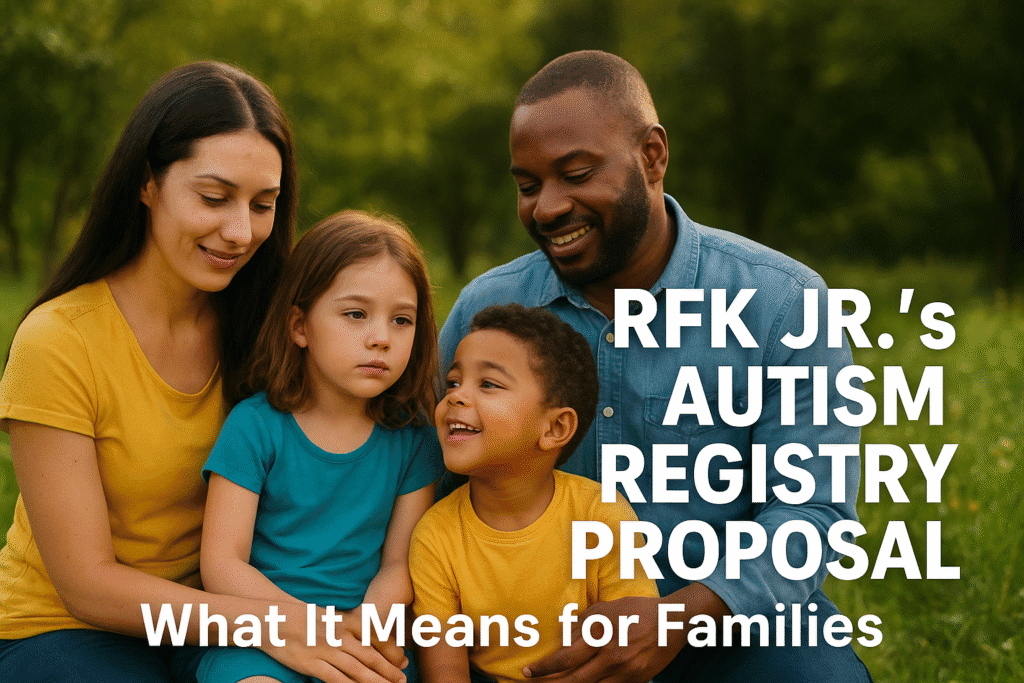Introduction
In 2025, a bold new idea has captured headlines across the United States: RFK Jr.’s autism registry proposal. While some families see it as a step toward better research, support, and funding, others raise serious concerns about privacy, ethics, and government overreach.
But what exactly does this proposal mean for families living with autism? And how will it shape the way autism is understood, studied, and supported in the years ahead?
This in-depth article breaks down the details, explores both sides of the debate, and highlights what families should know moving forward.
📌 What Is RFK Jr.’s Autism Registry Proposal?
RFK Jr., a prominent political figure, introduced the autism registry proposal as part of his health policy plan. The core idea is to create a national autism database where children and adults diagnosed with autism would be registered.
The goals include:
- 🧪 Improving Research → A centralized database could help scientists identify genetic, medical, and environmental factors.
- 🏥 Better Services → Families could access more tailored health, education, and therapy programs.
- 📊 Policy Insights → Lawmakers would gain clearer data to design autism-friendly policies.
On the surface, this may sound like progress—but the autism registry proposal comes with complex questions.
🔍 Why Families Are Divided
Families across the U.S. have expressed mixed feelings about the autism registry proposal.
✅ Supporters Say:
- “Finally, a way to make research meaningful!”
- “A national registry could improve access to resources.”
- “It may help detect autism earlier and provide interventions.”
❌ Critics Warn:
- “It risks exposing private medical information.”
- “The government could misuse or politicize autism data.”
- “Families fear being labeled or stigmatized.”
This clash of opinions highlights why the autism registry proposal has become one of the most talked-about autism topics in 2025.
🛡️ Privacy Concerns: A Major Roadblock
One of the strongest objections to the autism registry proposal is around privacy risks.
Imagine:
- Sensitive health records being stored in one national system.
- Potential hacking or unauthorized use.
- Insurance companies, employers, or schools accessing autism data unfairly.
These risks echo ongoing debates around autism privacy risks 2025 and raise questions about who truly controls personal medical data.
🌐 How Other Countries Handle Autism Registries
To understand the U.S. debate, it’s helpful to look globally.
- 🇸🇪 Sweden → Has a national autism registry with strong protections, which has advanced research significantly.
- 🇦🇺 Australia → Collects autism data but emphasizes voluntary participation.
- 🇨🇦 Canada → Regional autism data collection, not a single national system.
RFK Jr.’s autism registry proposal mirrors global trends, but U.S. families remain cautious about government involvement.
🧩 Impact on Families: The Human Side
Families raising children with autism often struggle with:
- 📚 Accessing therapies
- 💸 Managing financial burdens
- 🏫 Navigating schools and IEPs
- 💼 Employment challenges for autistic adults
Supporters believe the autism registry proposal could connect families to resources faster. Critics, however, fear it could add another layer of bureaucracy.
⚖️ The Ethical Debate
The autism registry proposal isn’t just about data—it’s about ethics.
Questions being asked:
- Do families have the right to opt-out?
- How will consent work for children?
- Who owns the data once collected?
- Can registries reduce stigma—or worsen it?
Balancing research with rights is at the heart of this debate.
📢 Public Reactions
Social media has exploded with conversations about RFK Jr.’s autism registry proposal.
- 💬 Some parents say: “If it helps our kids, why not?”
- 💬 Others argue: “We don’t want our children turned into statistics.”
- 🔥 Advocacy groups are split, with some calling it “revolutionary” and others labeling it “dangerous.”
🔮 What the Future May Hold
If the autism registry proposal moves forward, families can expect:
- More Research Funding → Studies may accelerate.
- Expanded Services → Registries could improve early intervention.
- Tighter Regulations → Privacy protections may need to be rewritten.
- Greater Public Debate → Families and advocacy groups will play a larger role.
💡 What Families Can Do Now
- Stay informed through autism advocacy groups.
- Speak up in public hearings about privacy concerns.
- Connect with legislators to ensure protections are in place.
- Support autism nonprofits working on safe data practices.

